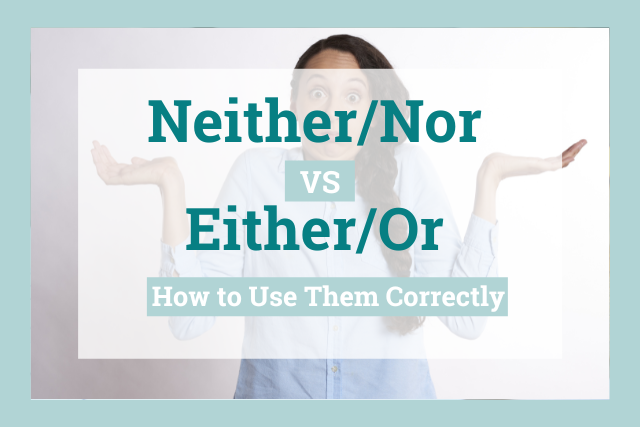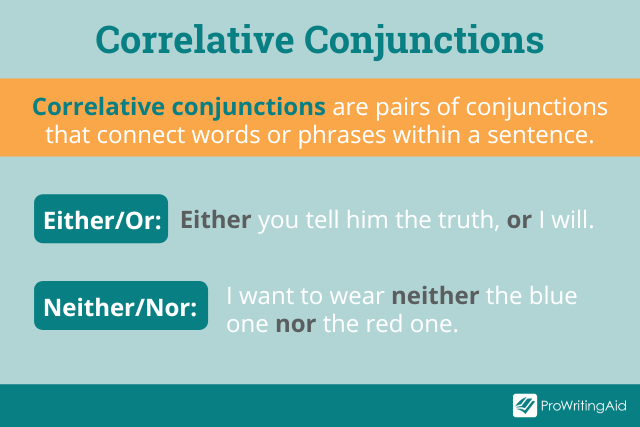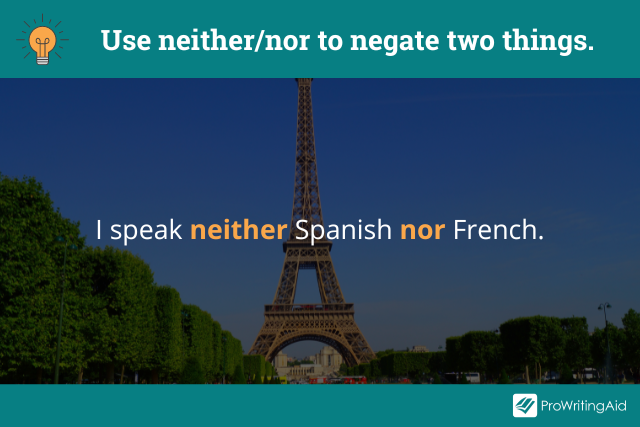
Two common sentence constructions we use in the English language are neither/nor and either/or.
Both of these phrases are correlative conjunctions: pairs of conjunctions that connect words or phrases within a sentence.

So how exactly do neither/nor and either/or work?
We use either/or to affirm each of two possibilities, and we use neither/nor to negate them.
For example, the sentence, “I want to eat either an apple or an orange” means that you want one of these two fruits, but you don’t know which one.
The sentence “I want to eat neither an apple nor an orange” means that you don’t want either of these two fruits.
This article provides a complete guide to neither/nor and either/or so you can use these phrases in your writing.
Neither/Nor
We use neither/nor to negate each of two things.
For example, you might say, “I speak neither Spanish nor French.” This negative statement means that you don’t speak Spanish, and you also don’t speak French.
You can use more than two options in a neither/nor construction by adding an additional nor before each option.
For example, you might say, “I speak neither Spanish nor French nor Chinese nor German.” That means you don’t speak any of the languages in the list.
You can use neither/nor with two words or two phrases.

Here are some more examples of neither/nor constructions in sentences:
- Neither my mother nor my father will buy me tickets to the concert on Saturday.
- So far, neither my sister nor I have found good job options in New York City.
- Neither rain nor hail will stop my friends from coming to my birthday party tonight.
- I want my daughter to join a sports team, but she’s interested in neither soccer nor basketball.
- I want to wear neither the blue nor the red one.
- The doctor says you should eat neither eggs nor dairy nor gluten.
- You are neither particularly smart nor particularly good-looking.
It’s important to note that a neither/nor phrase can function as the subject of a sentence, which performs the action, or the object of a sentence, which receives the action.
For example, you could say, “Neither Tom nor Jim went to class today.” In this case, “neither Tom nor Jim” is the subject of the sentence.
It would also be acceptable to say, “Today’s class was attended by neither Tom nor Jim.” In this case, “neither Tom nor Jim” is the object of the sentence.
Remember that you should use subject pronouns (such as I, she, and they) if you’re using a neither/nor phrase as a subject, and object pronouns (such as me, her, and them) if you’re using it as an object.
Correct Usage Examples of “Neither/Nor”
Let’s look at some examples of sentences from English literature that use a neither/nor construction.
“Home is neither here nor there. Home is within you, or home is nowhere at all.”—Herman Hesse, Bäume: Betrachtungen und Gedichte
“But magic is neither good nor evil. It is a tool, like a knife. Is a knife evil? Only if the wielder is evil.”—Rick Riordan The House of Hades
“Mr. Rochester, you must neither expect nor exact anything celestial of me — for you will not get it, any more than I shall get it of you: which I do not at all anticipate.”—Charlotte Brontë, Jane Eyre
“If you know the enemy and know yourself, you need not fear the result of a hundred battles. If you know yourself but not the enemy, for every victory gained you will also suffer a defeat. If you know neither the enemy nor yourself, you will succumb in every battle.”—Sun Tzu, The Art of War
“I can’t think of any greater happiness than to be with you all the time, without interruption, endlessly, even though I feel that here in this world there’s no undisturbed place for our love, neither in the village nor anywhere else.”—Franz Kafka, The Castle
“Security in a relationship lies neither in looking back to what was in nostalgia, nor forward to what it might be in dread or anticipation, but living in the present relationship and accepting it as it is now.”—Anne Morrow Lindbergh, Gift from the Sea
“Instinct is a marvelous thing. It can neither be explained nor ignored.”—Agatha Christie, The Mysterious Affair at Styles
Either/Or
We use either/or to present two options that we’re choosing between.

For example, you could say, “My sister is either at school or at home.” That means that your sister could be in each of these two places, but you’re not sure which one is true.
Here are some further examples of either/or in sentences:
- Either the trash can or the kitchen sink is emitting an awful smell.
- If either you or your brother step a toe out of line, you’ll both be grounded for a week!
- Either mom or dad must have taken the car to work this morning.
- Mom says I can have either chocolate ice-cream or strawberry shortcake for dessert.
- You can wear either a pantsuit or a cocktail dress to the party tonight.
- After school, we can either go swimming or to the mall.
- Either you tell him the truth, or I will.
According to traditional convention, you should only use either/or with two options, because the word either implies “one of two elements.”
As a result, many dictionaries dictate that it would be incorrect to say, “My sister is either at school or at home or at dance.”
However, you will see this rule broken in some books and articles, since not everyone agrees.
Just like with neither/nor, the either/or construction can be used as either the subject or object of a sentence.
For example, you could say, “Either Susan or Maggie ate my chocolate chip cookie.” In this case, “either Susan or Maggie” is the subject of the sentence.
You could also say, “My chocolate chip cookie must have been eaten by either Susan or Maggie.” In this case, “either Susan or Maggie” is the object of the sentence.
Again, remember that you should use subject pronouns (such as I, she, and they) if you’re using an either/or phrase as a subject, and object pronouns (such as me, her, and them) if you’re using it as an object.
“Either Or” Examples
Let’s look at some examples of sentences that use the either/or construction in English literature.
“There is nothing either good or bad, but thinking makes it so.”—William Shakespeare, Hamlet
“People aren't either wicked or noble. They're like chef's salads, with good things and bad things chopped and mixed together in a vinaigrette of confusion and conflict.”—Lemony Snicket, The Grim Grotto
“It is absurd to divide people into good and bad. People are either charming or tedious.”—Oscar Wilde, Lady Windermere’s Fan
“Life is either a daring adventure or nothing at all.”—Helen Keller, The Open Door
“They'll either want to kill you, kiss you, or be you.”—Suzanne Collins, Mockingjay
“Never trust people who smile constantly. They're either selling something or not very bright.”—Laurell K. Hamilton, Burnt Offerings
“She would defend herself, saying that love, no matter what else it might be, was a natural talent. She would say: You are either born knowing how, or you never know.”—Gabriel García Márquez, Love in the Time of Cholera
“Everyone you meet is a part of your journey, but not all of them are meant to stay in your life. Some people are just passing through to bring you gifts; either they're blessings or lessons.”—Roy T. Bennett, The Light in the Heart
“If he has to make a choice, may he make it now. Then I will either wait for him or forget him.”—Paulo Coelho, By the River Piedra I Sat Down and Wept
Conclusion on Neither/Nor and Either/Or
There you have it: a complete guide on how to use neither/nor and either/or.
Here’s a quick recap:
- Use neither/nor to negate each element in a list of elements.
- Use either/or to affirm each element in a pair of elements.
- Remember to use subject pronouns if the phrase functions as the subject of the sentence and object pronouns if it functions as the object.
If you want to make sure your writing is error-free, you can either run your work through ProWritingAid’s grammar checker or ask a skilled writer to look it over for you!


